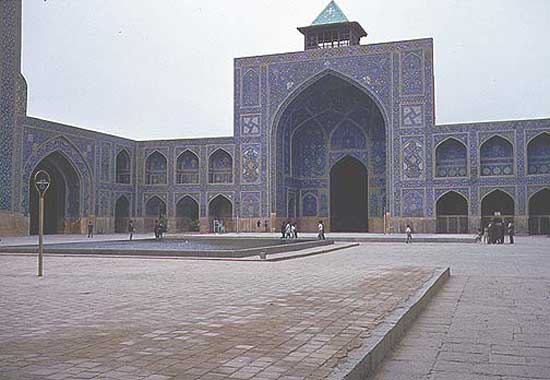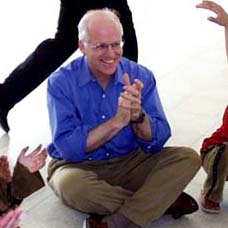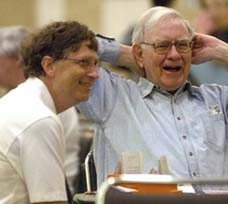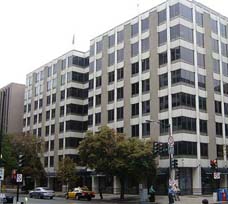
Moulton, a droll, 42-year-old biostatistician, learned of the Iranian project at a 1996 seminar at the Johns Hopkins School of Hygiene and Public Health. The vaccine trials offered him a unique opportunity to work in a country virtually closed to Americans for 20 years. But the real draw was the chance to realize his boyhood dream to visit the places where his Presbyterian grandfather, great-grandfather and great-great-grandfather ministered to the Muslim and Christian villagers of northern Iran. Moulton was writing another chapter in the family history in Iran. He walked amid the graves and saw those of several Cochrans, their names scripted in English and Syriac. He spotted the grave of his great-grandmother, his sister's namesake, Katharine Hale Cochran, the Vassar College girl from Minnesota whom his great-grandfather wed and took to Persia. She died in 1895.
The centuries-old scourge of leishmaniasis brought Benin RPCV Larry Moulton to Iran, a land where generations of his family ministered to the sick
Scientist realizes roots as healer in visit to Iran
Hopkins biostatistician helps doctors in search of leishmaniasis vaccine By Ann LoLordo
Sun Foreign Staff
TEHRAN, Iran -- A centuries-old scourge brought Larry Moulton to this land where generations of his family ministered to the sick.
Flying across an ocean and two continents, the Johns Hopkins public health specialist traveled to this 200-year-old capital and villages beyond to help an Iranian research team find a vaccine for a deadly, disfiguring parasitic disease.
For Moulton, this is not the land vilified by his government. It is a land recollected in childhood stories, the Persian rugs in his parent's homes, the Iranian miniatures on the walls, the whirling dervish begging bowl he played with as a boy.
This was the land of his mother Mary's birth, the place where his maternal great-grandfather, Dr. Joseph P. Cochran, founded a hospital and medical school in the late 19th century.
Moulton's great-grandfather Cochran, and his father before him, the Rev. Joseph G. Cochran, both died of typhoid fever in Iran. Moulton, a former Peace Corps worker in West Africa, always wanted to visit the family graves in northeastern Iran.
"Chance of a lifetime," the bearded and bespectacled scientist says of his opportunity to work here.
"In science,
there is no border, no religion, no politics. Just science," added Dr. Ali Khamesipour, Moulton's Iranian host.
Moulton initially knew little about the disease the Iranian doctors were battling. Ranked as one of the world's most confounding public health concerns, leishmaniasis afflicts about 12 million people in 88 countries.
International health experts suspect as many as 350 million people in Africa, South America, the Indian subcontinent, parts of Asia and the Mediterranean coast of southern Europe may be at risk of contracting the disease.
In its most virulent form, leishmaniasis kills. The strain, known as "kalazar" or visceral leishmaniasis, killed more than 50,000 people during an epidemic in southern Sudan between 1991 and 1993.
Moulton, a droll, 42-year-old biostatistician, learned of the Iranian project at a 1996 seminar at the Johns Hopkins School of Hygiene and Public Health. The vaccine trials offered him a unique opportunity to work in a country virtually closed to Americans for 20 years.
But the real draw was the chance to realize his boyhood dream to visit the places where his Presbyterian grandfather, great-grandfather and great-great-grandfather ministered to the Muslim and Christian villagers of northern Iran.
In Iran, the doctor overseeing the vaccine trials was Ali Khamesipour. The disease has taken the American-trained, Iranian microbiologist from his medical laboratory in Tehran to rural health clinics and schools across the country -- to places like Dastgard in a dusty agricultural region of central Iran where two forms of the disease are endemic, and spreading fast.
At the girls school there, a wide-eyed third-grader in white Muslim headdress and gray smock offered her small hand to Khamesipour.
He spotted the leishmaniasis sore immediately, a lesion seen in this country as long ago as the ninth century. Khamesipour asked Marziah Barati whether anyone in her family had the sores.
Two brothers and a sister, she replied.
Named for a 19th-century British army surgeon who discovered the disease-causing parasite, leishmaniasis is transmitted by the bites of a mosquito-like sand fly or a gerbil-like rodent.
Small bumps appear under the skin. They bloom into lesions that can become ulcerous and painful. In its acute and yet most benign form, the lesions heal within several months. But some patients live with the sores for years, some with several dozen.
If the lesions heal, they often leave a horrible scar that, in this traditional society, can affect a family's ability to marry off its daughters.
The scars are so prevalent that Taghi Shafioff, the school's male nurse, says that "in the past, they used to believe that anybody who doesn't have the scar of leishmaniasis is a bastard."
Shafioff has seven scars. The school's custodian turned her left cheek to reveal a spider web-like scar. The vice principal lifted up the hem of her coat-like manteau to show a scarred leg.
In a class of 35 fifth-graders, 13 said they have had "salak," the Farsi word for the disease.
`My face would be ruined'
Vahideh Maimar fears she will wake one day to find a sore on her face. "My face would be ruined," the 11-year-old said. "I would be ugly."
Khamesipour and his team of Iranian researchers are at the forefront of efforts to test a vaccine against leishmaniasis.
"There is not a single effective vaccine against any human parasitic infection," said David Sacks, an immunologist at the National Institutes of Health in Bethesda and a volunteer consultant to the Iranian trials. "`There's not one against malaria or sleeping sickness. Even a vaccine against leishmaniasis that worked marginally would be somewhat of a first."
Over more than four years, Khamesipour and his public health team have injected about 6,100 children with a placebo or a dead form of the parasite that causes the disease in the course of blind trials. The dead parasites are injected with a live vaccine called BCG that is used to immunize people against tuberculosis in many parts of the world. It is thought that the BCG will make the immune response against the dead parasites more powerful.
The trick to find just the right dose to stimulate an immune response against leishmaniasis. Such a vaccine would protect people from future infection or decrease the severity of the disease once contracted.
Now, the disease is commonly treated with an antibiotic-like injection. But the cost -- from $12 to $181 -- puts treatment out of reach for most victims who live in poverty. And, if a person's immune system is suppressed, treatment is ineffective.
In the past, attempts to rid Iran of the carriers failed. A spraying campaign against the velvet-winged flies also failed. So did efforts to poison the furry gerbils.
"That makes the vaccine the most important way to protect the people against the disease," said Khamesipour. "If it protects 50 percent of the people, we are saving thousands of lives every year in Sudan, India, Ethiopia."
Although Iran actually harbors the least deadly form of the disease, the World Health Organization chose it as a site of three vaccine trials because of the country's experience with the disease, its system of health clinics and its well-trained physicians. Trials are also under way in Sudan, Venezuela, Colombia and Ecuador.
In 1993, while he was a post-doctoral fellow at the University of California in Irvine, Khamesipour was invited by a former teacher to head up the Iranian vaccine trial. Khamesipour, who agreed to lead the WHO-sponsored project, says: "I wanted to do something for my country."
In Baltimore, Dr. Lawrence H. Moulton got a similar request three years ago. The Iranians needed help organizing and monitoring their data. Moulton had evaluated measles and influenza vaccine trials in the past.
"I saw some real potential for collaboration," he said.
"They have been trying out pretty basic vaccines in these trials. First one shot, then two shots, now three shots," said Moulton. "I was especially impressed by this group in Iran, by how much they have been able to put together on a shoestring."
While Moulton describes his role as that of "a bit player," Khamesipour is consumed by the project.
Before dawn one morning, Khamesipour set out for Zavoreh, a town in central Iran where half of the 8,000 residents are infected with leishmaniasis. A vaccine trial is under way and monitoring is essential.
But follow-up of about 200 patients in the 2,120-person trial was lax. The Shahid Nasahi Clinic lost track of many of the patients when their employer, an oil company, relocated. Khamesipour explained to the clinic director that his staff had to find them. "We need to account for as many as possible to maintain the integrity of the trial."
As Khamesipour met with the health care workers, Abu Tali Rafii shuffled into the clinic. The 39-year-old teacher could barely walk because of the large, pus-filled ulcer on his swollen foot. "Five months, it's been this way," Rafii told Khamesipour.
After examining several patients, Khamesipour climbed into his buff-colored Toyota and drove to the neighboring town of Ardestan. Three trial subjects had not shown up that morning for their checkup. Khamesipour arrived to find two men waiting for him. Khamesipour examined their vaccine sites, measured and photographed them.
Then, Saik Allah Sedagh walked in. Khamesipour smiled.
"He has not come to see me for two months," the doctor said as the 50-year-old driver rolled up his shirt sleeve and displayed his vaccine scar. "Ah, he's very good. He's healed. If the lesion starts and heals, we are 100 percent sure they are protected."
So far, the Iranian trials have shown that the vaccine regime is safe. But they have yet to determine the right dose to protect the world against the disease.
"After four years," Khamesipour said, "we know that a single injection doesn't work. It's not something you can speculate through science. You have to go through the trial."
But the trials are paying off.
On his most recent trip to Iran, Moulton, the Hopkins consultant, joined Khamesipour and representatives from the WHO, the London School of Hygiene and Tropical Medicine and Iran's Center for Research and Training in Skin Diseases and Leprosy at a meeting in Tehran.
The experts met to determine if the Iranian vaccine team was any closer to its goal. Their review found the project to be on track. In a year, the trial results would be known.
Another mission
After finishing his consulting work in Tehran, Moulton had enough time to complete another mission -- to visit the family grave site.
He flew to Orumiyeh, the northeastern Iranian town where his ancestors had lived and worked. Moulton was met by a local medical historian who is writing a book about his great-grandfather Cochran.
They toured the site of the hospital and medical school founded by his Yale-educated great-grandfather in 1882. The trees apparently planted by his great-grandfather at the entrance of the medical school now stand 100 feet tall.
From there, they drove up Mount Sier to the walled, Presbyterian mission graveyard. A Kurdish shepherd stood among grazing flocks. Snow-capped mountains soared into a cloudless blue sky.
Moulton was writing another chapter in the family history in Iran. He walked amid the graves and saw those of several Cochrans, their names scripted in English and Syriac. He spotted the grave of his great-grandmother, his sister's namesake, Katharine Hale Cochran, the Vassar College girl from Minnesota whom his great-grandfather wed and took to Persia. She died in 1895.
"Tears were welling up in my eyes," Moulton recalled.
At his great-grandfather's grave, Moulton stopped. The 1000-pound tombstone had fallen over.
"While we were there, three Kurdish men came by," Moulton said. "One of them went off and got a long metal bar. We all pushed and leveraged it and got the thing up again."
Now, Moulton could read his great-grandfather's name, Joseph P. Cochran (1855-1905) and the biblical epitaph, "He came not to be ministered unto, but to minister."
Originally published on May 30 1999























